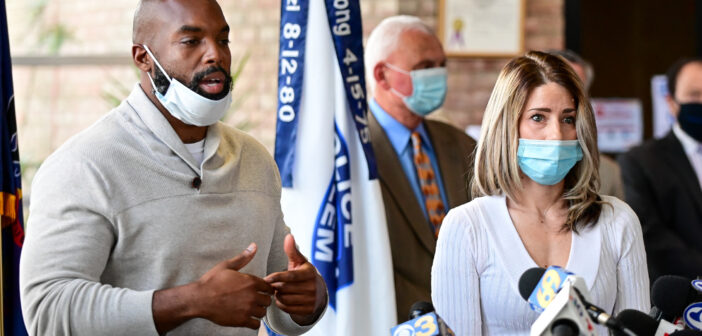The Bethlehem Police Department has implemented a pilot program to partner with social workers, as of Oct. 1. Bethlehem Health Bureau Community Health Specialist, Jordan Westerman, said this program will foster community support and improve police experiences.
“Social workers have skills to use de-escalation and really to support police as well,” Westerman said.
She said BPD has received many calls in the past regarding mental health issues and domestic violence, which are areas that officers were not specifically trained in. As a result, the community members who called BPD for those reasons were not receiving adequate help.
Westerman said BPD and the Bethlehem Health Bureau wanted to create a specific program that would combat these issues.
As per the program’s protocol, police reports are emailed to Westerman, who works as one of the program’s social workers. From there, Westerman said she contacts the people involved in the situation, follows up, provides either a home visit or a phone call and connects them to adequate services.
After helping a family or individual, Westerman said the social workers also provide a 30 to 90 day follow-up.
Westerman said police officers refer individuals to a social worker when their situation involves partner violence, domestic violence, inhabitable living conditions, family intervention needs, disabilities, mental health, substance abuse and eldercare.
She said the social workers help individuals get connected to mental health services, counseling services and other social agencies.
Westerman is currently the only social worker for BPD, though she has two interns who assist with the program.
Westerman said police training is another aspect of the program.
As a part of this training, Westerman spoke to police officers about the requirements for referring an individual to social workers, how to make a referral and what to do when a social worker is not available. She said the training she does is not extensive because they are currently collecting data.
According to data collected by the Bethlehem Health Bureau, most police cases that are referred to social workers involve undiagnosed crises or eldercare. The age groups with the most referrals are 30 to 40 and 50 to 60-year-olds.
“Overall, this has been such a positive experience,” Westerman said. “The police officers have been very accepting.”
Due to the pandemic, Westerman said it has been difficult to conduct home visits, which has been a challenge for the program.
She said she hopes to gain more funding for the program going forward so that it can expand. She also hopes to increase officer training and conduct multidisciplinary meetings to further improve the program.
Bethlehem is not the only police department working on social worker integration. The Bucks County Police Department started their own program for similar reasons, Director of Human Services at BCPD, Rachael Neff said.
Neff said the goals of the program include connecting community members to the appropriate community-based resources and referrals. She said social workers are better suited to respond in those situations than police officers.
“In Bucks County Police, we paired social workers with police officers to respond to calls that came in that were more social service and human service in nature,” Neff said.
Since the program’s launch in December of 2020, Neff said Bucks County has already seen improvement. She said frequent 911 callers are calling less, and there have been over 170 referrals from officers to social workers.
Aside from police departments, other local organizations are beginning to partner with social workers. Bethlehem Public Defender Kimberly Makoul said she and her team are using client advocates with some of their cases.
“There is a model of representation that has been studied and has been utilized very successfully by other public defender’s offices throughout the country. It’s called a holistic representation model,” Makoul said. “The representation centers around the client, and that representation has to address issues other than just the offense in which the person is charged.”
Makoul said these client advocates aid clients throughout their entire legal process, from the day they first receive help from their public defender. She said it is easier for clients to find a social worker that works with the public defender, so they do not have to search elsewhere for resources.
Makoul said she and her team have been doing this for three years. She said the attorneys do not go through extensive training, but they learn the process of how to refer a client to a client advocate.
Makoul said the program has been very successful and seamless so far.
“When all of these services are in place, we have better outcomes for our clients,” Makoul said.






Comment policy
Comments posted to The Brown and White website are reviewed by a moderator before being approved. Incendiary speech or harassing language, including comments targeted at individuals, may be deemed unacceptable and not published. Spam and other soliciting will also be declined.
The Brown and White also reserves the right to not publish entirely anonymous comments.